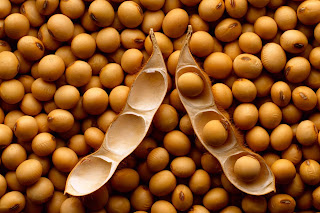Is Soy Safe for Women?
Soy tends to be a major player in most plant-based diets, and some studies have suggested that consuming soy foods, like tofu and soy milk, benefits cardiovascular health, weight loss, and prevention of certain cancers. But conflicting soy studies have confused the issue for most consumers, especially women, leaving us all to ask: Is soy safe?
I cut cow’s milk out of my diet over a year ago, so I’ve known for some time that soy milk is delicious and full of protein. But until recently, I didn’t know what research says about soy and women’s health. More specifically, I didn’t know that soy is actually safe for women. Here’s the thing though: Recent studies, like this one from Tufts University, show that soy isn’t just safe—it may even inhibit development or recurrence of breast cancer cells.
I’ve had to unlearn so much about nutrition since becoming vegan that I figured there was probably a lot I needed to unlearn about soy. So a few months ago, I started Googling the heck out of “is soy safe for women.”
Soy Can Help Reduce Risk of Breast Cancer
When I asked Hever about soy and breast cancer, she said soy does impact breast health but opposite to the way many believe. “Soy helps reduce risk of breast cancer,” Hever says. “Instead of being concerned about phytoestrogens found in soy foods and other foods, women should be concerned about the hormonally active mammalian estrogens found in dairy products, which actually have been associated with an increased risk for breast cancer.” Hever adds that the American Institute for Cancer Research actually recommends soy as a cancer-fighting food because it is associated with decreased risk for breast cancer recurrence and mortality. Additionally, “Consuming soy foods early in life—during childhood or adolescence—may lower lifetime risk for breast cancer,” Hever says, which makes sense, since studies indicate that populations that consume the most soy have the lowest rates of breast cancer.
How Soy Works in Your Body
Soy contains naturally occurring estrogenic compounds called isoflavones, the discovery of which seems to have caused a lot of confusion around how soy affects breast health. Isoflavones are considered phytoestrogens, or plant estrogens, which means that isoflavones can mimic estrogen in the body. Since higher estrogen levels are associated with higher risk of breast cancer, many women fear that consuming plant estrogens will increase their risk of developing breast cancer. But that isn’t how isoflavones typically work.
See, women’s bodies have two estrogen receptors, alpha and beta. If an isoflavone binds to the alpha receptor, it could increase a woman’s risk of breast cancer because the alpha receptor causes breast cells to grow. Binding to beta, on the other hand, creates the opposite effect. As it turns out, isoflavones preferentially bind to the beta receptor.
If Your Thyroid Is Healthy, Soy Is No Problem
In the mid-2000s, research found that soy can interfere with the body’s ability to absorb a synthetic thyroid hormone often used to treat hypothyroidism—but soy doesn’t appear to cause thyroid problems. In fact, soy doesn’t seem to affect a functioning thyroid whatsoever. Hever confirms: “Soy foods do not adversely impact a healthy thyroid. However, if you have a thyroid condition, be aware that soy protein may interfere with some thyroid medications, but dosages may be adjusted accordingly.”
If you have a thyroid condition and want to continue eating soy foods, you also need to make sure your iodine intake is adequate. Hever recommends 150 micrograms per day for adults. Additionally, the Mayo Clinic suggests waiting four hours after taking thyroid medication to consume any products that might contain soy protein.




评论
发表评论